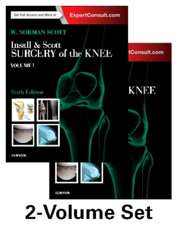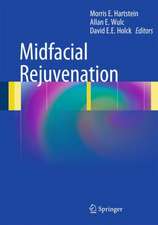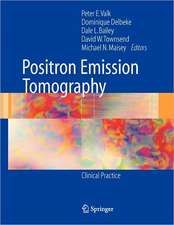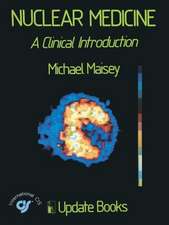Positron Emission Tomography: Basic Sciences
Editat de Dale L. Bailey, David W. Townsend, Peter E. Valk, Michael N. Maiseyen Limba Engleză Hardback – 4 iul 2005
This book is primarily repackaged content from the Basic Science section of the 'big' Valk book on PET. It contains new, completely revised and unchanged chapters covering the "basic sciences" section of the main book - total 18 chapters:
- 2 new (chapters 1, 16)
- 8 completely revised (chapters 4, 5, 8, 13, 14, 15, 17, 18)
- 3 minor corrections (chapters 2, 6, 11)
- 5 unchanged (chapters 3, 7, 9, 10, 12)
| Toate formatele și edițiile | Preț | Express |
|---|---|---|
| Hardback (2) | 1818.04 lei 6-8 săpt. | |
| SPRINGER LONDON – 4 iul 2005 | 1818.04 lei 6-8 săpt. | |
| SPRINGER LONDON – 5 mai 2003 | 2497.39 lei 6-8 săpt. |
Preț: 1818.04 lei
Preț vechi: 1913.73 lei
-5% Nou
Puncte Express: 2727
Preț estimativ în valută:
347.97€ • 361.91$ • 291.60£
347.97€ • 361.91$ • 291.60£
Carte tipărită la comandă
Livrare economică 13-27 martie
Preluare comenzi: 021 569.72.76
Specificații
ISBN-13: 9781852337988
ISBN-10: 1852337982
Pagini: 382
Ilustrații: X, 382 p. 237 illus., 27 illus. in color.
Dimensiuni: 216 x 279 x 28 mm
Greutate: 1.16 kg
Ediția:2003
Editura: SPRINGER LONDON
Colecția Springer
Locul publicării:London, United Kingdom
ISBN-10: 1852337982
Pagini: 382
Ilustrații: X, 382 p. 237 illus., 27 illus. in color.
Dimensiuni: 216 x 279 x 28 mm
Greutate: 1.16 kg
Ediția:2003
Editura: SPRINGER LONDON
Colecția Springer
Locul publicării:London, United Kingdom
Public țintă
Professional/practitionerCuprins
Positron Emission Tomography in Clinical Medicine.- Physics and Instrumentation in PET.- Data Acquisition and Performance Characterization in PET.- Image Reconstruction Algorithms in PET.- Quantitative Techniques in PET.- Tracer Kinetic Modeling in PET.- Coregistration of Structural and Functional Images.- Anato-Molecular Imaging: Combining Structure and Function.- Radiohalogens for PET Imaging.- Progress in 11C Radiochemistry.- Metal Radionuclides for PET Imaging.- Radiation Dosimetry and Protection in PET.- Whole-Body PET Imaging Methods.- Artefacts and Normal Variants in Whole-Body PET and PET/CT Imaging.- The Technologist’s Perspective.- PET Imaging in Oncology.- The Use of Positron Emission Tomography in Drug Discovery and Development.- PET as a Tool in Multimodality Imaging of Gene Expression and Therapy.
Recenzii
From the reviews:
It is, simply put, the best work I have encountered on the "non-clinical" aspects of the important field of PET. The scientific features are explained clearly at all levels and are well illustrated so that the treatment will suit both experts in physics and radiochemistry and newcomers hoping to understand and perhaps use the techniques. The recent - and now seemingly indispensable - addition of CT to PET scanners is covered by discussions of theory, image registration and attenuation correction. At only £65 this book is a bargain. My only criticism of the book then is the sense of frustration it arouses by not having the equipment available to start exploiting it. [RAD Magazine, February, 2006]
According to the authors, the purpose is to provide a comprehensive "science of PET" textbook which is more focused and manageable than the original. The authors' intent is "to illustrate the power of clinical PET in substantially altering patient management, thereby avoiding futile aggressive therapy and improving cost effectiveness." The purpose and intent are very laudable, because PET is rapidly gaining momentum in the clinical arena. The book meets the authors' objectives in a superb manner. This book is a must read for physicists, chemists, physicians, and advanced technologists involved or interested in PET. It is the definitive reference in the field at the time of publication. (William R. Hendee, Doody Enterprises, Inc. - COPYRIGHT 2006)
"Positron Emission Tomography: Basic Sciences is a well written book … . This book provides a detailed discussion of the fusion process and the role of CT for anatomical localisation and attenuation correction … . What makes this book important and informative to any reader is that it is a collection of chapters written by luminaries in the field of PET. … We would recommend it to any scientists and clinicians with an interest in medical imaging." (Seu Som and Peter Lim,CancerForum, Vol. 30 (3), November, 2006)
"Essential for students, science and medical graduates who want to understand the basic science of Positron Emission Tomography (PET), this book describes the physics, chemistry, technology and overview of the clinical uses behind the science of PET and the imaging techniques it uses. … The technologist, the science engineering or chemistry graduate seeking further detailed information about PET, or the medical advanced trainee wishing to gain insight into the basic science of PET will faind (sic) this book invaluable." (Rivista di Neuroradiologia, Vol. 18 (2), 2005)
It is, simply put, the best work I have encountered on the "non-clinical" aspects of the important field of PET. The scientific features are explained clearly at all levels and are well illustrated so that the treatment will suit both experts in physics and radiochemistry and newcomers hoping to understand and perhaps use the techniques. The recent - and now seemingly indispensable - addition of CT to PET scanners is covered by discussions of theory, image registration and attenuation correction. At only £65 this book is a bargain. My only criticism of the book then is the sense of frustration it arouses by not having the equipment available to start exploiting it. [RAD Magazine, February, 2006]
According to the authors, the purpose is to provide a comprehensive "science of PET" textbook which is more focused and manageable than the original. The authors' intent is "to illustrate the power of clinical PET in substantially altering patient management, thereby avoiding futile aggressive therapy and improving cost effectiveness." The purpose and intent are very laudable, because PET is rapidly gaining momentum in the clinical arena. The book meets the authors' objectives in a superb manner. This book is a must read for physicists, chemists, physicians, and advanced technologists involved or interested in PET. It is the definitive reference in the field at the time of publication. (William R. Hendee, Doody Enterprises, Inc. - COPYRIGHT 2006)
"Positron Emission Tomography: Basic Sciences is a well written book … . This book provides a detailed discussion of the fusion process and the role of CT for anatomical localisation and attenuation correction … . What makes this book important and informative to any reader is that it is a collection of chapters written by luminaries in the field of PET. … We would recommend it to any scientists and clinicians with an interest in medical imaging." (Seu Som and Peter Lim,CancerForum, Vol. 30 (3), November, 2006)
"Essential for students, science and medical graduates who want to understand the basic science of Positron Emission Tomography (PET), this book describes the physics, chemistry, technology and overview of the clinical uses behind the science of PET and the imaging techniques it uses. … The technologist, the science engineering or chemistry graduate seeking further detailed information about PET, or the medical advanced trainee wishing to gain insight into the basic science of PET will faind (sic) this book invaluable." (Rivista di Neuroradiologia, Vol. 18 (2), 2005)
Caracteristici
Essential manual for scientists and clinicians alike to understand PET in biologic systems First book to address the scientific issues of PET for clinicians with a research interest










